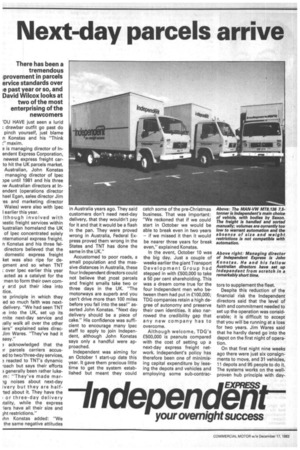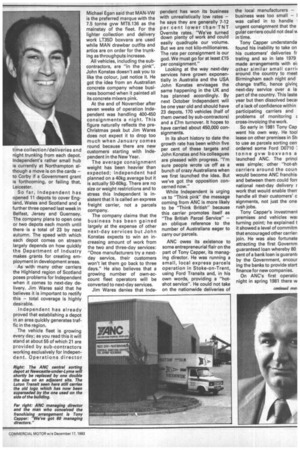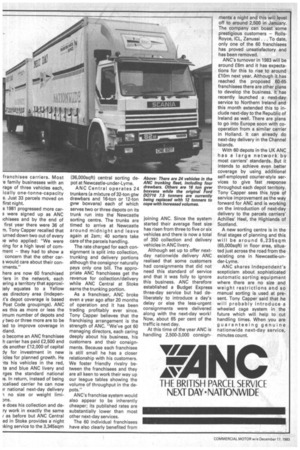Next-day parcels arrive
Page 46

Page 47

Page 48

If you've noticed an error in this article please click here to report it so we can fix it.
There has been a tremendous provement in parcels ervice standards over le past year or so, and David Wilcox looks at two of the most enterprising of the newcomers
'OU HAVE just seen a lurid ; drawbar outfit go past do pinch yourself, just blame n Konstas and his "Think :" maxim.
a is managing director of Inendent Express Corporation, newest express freight carto hit the UK parcels market. Australian, John Konstas managing director of 'pee )pe until 1981 and his three ivy Australian directors at Inendent (operations director hael Egan, sales director Jim :es and marketing director Wales) were also with lpec I earlier this year.
lthough involved with iestic freight services within ‘ustralian homeland the UK of !pee concentrated solely nternational express freight. n Konstas and his three feldirectors believed that the domestic express freight ket was also ripe for depment and so when TNT : over lpec earlier this year acted as a catalyst for the men to form their own corny ard put their idea into :tice.
le principle in which they ed so much faith was nextdelivery. "We had seen TNT le into the UK, set up its mite next-day service and Jelly walk all over the other iers" explained sales direcJim Wares. "They've had it easy."
.1 acknowledged that the !r parcels carriers accused to two/three-day services, .1 reacted to TNT's dynamic 'oach but says their efforts 3 generally been rather lukem: "They've made mar noises about next-day ivery but they are half-ted about it. They have the or three-day delivery itality, while the express -iers have all their size and )ht restrictions."
hn Konstas added: "We the same negative attitudes in Australia years ago. They said customers don't need next-day delivery, that they wouldn't pay for it and that it would be a flash in the pan. They were proved wrong in Australia, Federal Express proved them wrong in the States and TNT has done the same in the UK."
Accustomed to poor roads, a small population and the massive distances in Australia, these four Independent directors could not believe that snost parcels and freight smalls take two or three days in the UK. "The motorways are superb and you can't drive more than 100 miles before you fall into the sea!" asserted John Konstas. "Next day delivery should be a piece of cake." His confidence was sufficient to encourage many 'pee staff to apply to join Independent, although John Konstas says only a handful were approached.
Independent was aiming for an October 1 start-up date this year. It gave them precious little time to get the system established but meant they could catch some of the pre-Christmas business. That was important: "We reckoned that if we could start in October we would be able to break even in two years — if we missed it then it would be nearer three years for break even," explained Konstas.
In the event, October 10 was the big day. Just a couple of weeks earlier the giant Transport Development Group had stepped in with £500,000 to take a 50 per cent shareholding. This was a dream come true for the four Independent men who between them had put in £100,000; TDG companies retain a high degree of autonomy and preserve their own identities. It also narrowed the credibility gap that any new company has to overcome.
Although welcome, TDG's £500,000 is peanuts compared with the cost of setting up a next-day express freight network. Independent's policy has therefore been one of minimising capital expenditure by leasing the depots and vehicles and employing some sub-contrac tors to supplement the fleet. Despite this reduction of the financial risk the Independent directors said that the level of faith and commitment needed to set up the operation was consid erable; it is difficult to accept that you will be running at a loss for two years. Jim Wares said that he hardly dared go into the depot on the first night of operation.
On that first night nine weeks ago there were just six consignments to move, and 31 vehicles, 11 depots and 95 people to do it. The systems works on the well proven hub principle with day time collection/deliveries and night trunking from each depot. Independent's rather small hub is currently at Northampton although a move is on the cards — to Corby if a Government grant is forthcoming, or failing that, Leicester.
So far, Independent has opened 11 depots to cover England, Wales and Scotland and a further three opened last week in Belfast, Jersey and Guernsey. The company plans to open one or two depots each month until there is a total of 23 by next autumn. The speed with which each depot comes on stream largely depends on how quickly the Department of Industry makes grants for creating employment in development areas.
As with many other carriers the Highland region of Scotland poses problems for Independent when it comes to next-day delivery. Jim Wares said that he believes it is important to rectify this — total coverage is highly desirable.
Independent has already proved that establishing a depot in an area quickly generates traffic in the region.
The vehicle fleet is growing every day; as you read this it will stand at about 55 of which 21 are provided by sub-contractors working exclusively for Independent. Operations director Michael Egan said that MAN-VW is the preferred marque with the 7.5 tonne gvw MT8.136 as the mainstay of the fleet. For the lighter collection and delivery work LT35D boxvans are used while MAN drawbar outfits and artics are on order for the trunking as throughputs increase.
All vehicles, including the subcontractors, are "in the pink". John Konstas doesn't ask you to like the colour, just notice it. He got the idea from an Australian concrete company whose business boomed when it painted all its concrete mixers pink.
At the end of November after seven weeks of operation Independent was handling 400-450 consignments a night. This figure naturally reflects the preChristmas peak but Jim Wares does not expect it to drop too much when January comes round because there are new customers starting with Independent in the New Year.
The average consignment weight has been heavier than expected; Independent had planned on a 40kg average but it is actually 50-60kg. There are no size or weight restrictions and to stress this Independent is insistent that it is called an express freight carrier, not a parcels company.
The company claims that the business has been gained largely at the expense of other next-day services but John Konstas expects to win an increasing amount of work from the two and three-day services: "Once manufacturers try a nextday service, their customers won't let them go back to three days." He also believes that a growing number of own-account fleet operators will be converted to next-day services.
Jim Wares denies that Inde
pendent has won its business with unrealistically low rates — he says they are generally 7-12 per cent lower than TNT Overnite rates. "We've turned down plenty of work and could easily quadruple our volume. But we are not kilo-millionaires. The rate per consignment is our god. We must go for at least £15 per consignment."
Looking at the way next-day services have grown exponen tially in Australia and the USA John Konstas envisages the same happening in the UK and has planned accordingly. By next October Independent will be one year old and should have 23 depots, 170 vehicles (half of them owned by sub-contractors) and a £7m turnover. It hopes to have carried about 450,000 consignments.
In its short history to date the growth rate has been within five per cent of these targets and John Konstas and his colleagues are pleased with progress. "I'm sure people wrote us off as a bunch of crazy Australians when we first launched the idea. But we've got the opposition concerned now."
While Independent is urging us to "Think pink" the message coming from ANC is more likely to be "Think British" because this carrier promotes itself as "The British Parcel Service" — an oblique reference to the number of Australians eager to carry our parcels.
ANC owes its existence to some entrepreneurial flair on the part of Tony Capper, its managing director. He was running a small, local express parcels operation in Stoke-on-Trent, using Ford Transits and, in his own words, providing a "hotshot service". He could not take on the nationwide deliveries of the local manufacturers — business was too small — I was called in to handle • urgent consignment that the gular carriers could not deal vr in time.
Tony Capper understanda found his inability to take on his customers' deliveries fr trating and so in late 1979 made arrangements with ei! other similar small carrif around the country to meet Birmingham each night and change traffic, hence givinc next-day service over a la part of the country. This laste year but then dissolved becat of a lack of confidence within participating carriers and problems of monitoring E cross-invoicing the work.
So early in 1981 Tony Cap went his own way. He tool lease on other premises in St, to use as parcels sorting cen ordered some Ford D0710 ; tonne gvw boxvans a launched ANC. The princi was simple; other "hot-sh carriers around the coun would become ANC franchis, and between them could forr national next-day delivery r work that would enable therr handle all their customers' c signments, not just the one rush jobs.
Tony Capper's investment premises and vehicles wa. turning point; he explained t it showed a level of commitm that encouraged other carrier: join. He was also fortunate attracting the first Governm guaranteed loan whereby 80 cent of a bank loan is guaranti by the Government, encour ing the banks to provide start finance for new companies.
On ANC's first operatic night in spring 1981 there w
franchisee carriers. Most .e family businesses with an
rage of three vehicles each, ically one-tonne-capacity s. Just 33 parcels moved on first night.
s 1981 progressed more cars were signed up as ANC ichisees and by the end of first year there were 36 of m. Tony Capper recalled that urned down two out of every :e who applied: "We were (ing for a high level of comment — they had to show a concern that the other cars would care about their conlments."
here are now 60 franchised -iers in the network, each ering a territory that approxiely equates to a Yellow es directory area (Indepent's depot coverage is based Post Code groupings). ANC vs this as more or less the imum number of depots and yt two or three more are to be led to improve coverage in o become an ANC franchisee h carrier has paid £2,500 and ds another £12,000 of capital iy for investment in new icles for planned growth. He -Its his vehicles in the red, te and blue ANC livery and rges the standard national !s. In return, instead of being )calised carrier he can now anational next-day delivery 1 no size or weight limiDns.
e does his collection and dery work in exactly the same as before but ANC Central ed in Stoke provides a night lking service to the 3,345sqm (36,000sqft) central sorting depot at Newcastle-under-Lyme.
ANC Central operates 24 trunkers (a mixture of 32-ton gtw drawbars and 16-ton or 12-ton gvw boxvans) each of which serves two or three depots on its trunk run into the Newcastle sorting centre. The trunks are timed to arrive at Newcastle around midnight and leave again at 2am; 40 sorters take care of the parcels handling.
The rate charged for each consignment is split into collection, trunking and delivery portions although the consignor naturally pays only one bill. The appropriate ANC franchisees get the revenue for collection/delivery while ANC Central at Stoke earns the trunking portion.
As a franchiser, ANC broke even a year ago after 20 months of operation and it has been trading profitably ever since. Tony Capper believes that the franchising arrangement is the strength of ANC. "We've got 60 managing directors, each caring deeply about his business, his customers and their consignments. Because each franchisee is still small he has a closer relationship with his customers. We foster friendly rivalry between the franchisees and they are all keen to work their way up our league tables showing the volume of throughput in the depots."
ANC's franchise system would also appear to be inherently cheaper; its published rates are substantially lower than most other next-day services.
The 60 individual franchisees have also clearly benefited from joining ANC. Since the system started their average fleet size has risen from three to five or six vehicles and there is now a total of 350 collection and delivery vehicles in ANC livery.
Although set up to offer nextday nationwide delivery ANC realised that some customers had consignments that did not need this standard of service and that it was folly to ignore this business. ANC therefore established a Budget Express three-day service but had deliberately to introduce a day's delay or else the less-urgent consignments were delivered along with the next-day work! Now, about 65 per cent of the traffic is next day.
At this time of the year ANC is handling 2,500-3,000 consign ments a night and this will level off to around 2,500 in January. The company can boast some prestigious customers — RollsRoyce, ICL, Zanussi . . To date, only one of the 60 franchisees has proved unsatisfactory and has been removed.
ANC's turnover in 1983 will be around £6m and it has expectations for this to rise to around £10m next year. Although it has reached the proposed 60-65 franchisees there are other plans to develop the business. It has recently launched a next-day service to Northern Ireland and this month extended this to include next-day to the Republic of Ireland as well. There are plans to go into Europe soon with cooperation from a similar carrier in Holland. It can already do next-day delivery in the Channel Islands.
With 60 depots in the UK ANC has a large network by most carriers' standards. But it intends to achieve even better coverage by using additional self-employed courier-style services to give fast response throughout each depot territory. Tony Capper sees this type of service improvement as the way forward for ANC and is working on the introduction of next-day delivery to the parcels carriers' Achilles' Heel, the Highlands of Scotland.
A new sorting centre is in the final stages of planning and this will be around 6,2 3 5sqm (65,000sqft) in floor area, situated just across the road from the existing one in Newcastle-under-Lyme.
ANC shares Independent's scepticism about sophisticated automatic sorting equipment where there are no size and weight restrictions and so manual sorting is used at present. Tony Capper said that he will probably introduce a wheeled cage system in the future which will help to cut handling times. When you are guaranteeing genuine nationwide next-day service, minutes count












































































